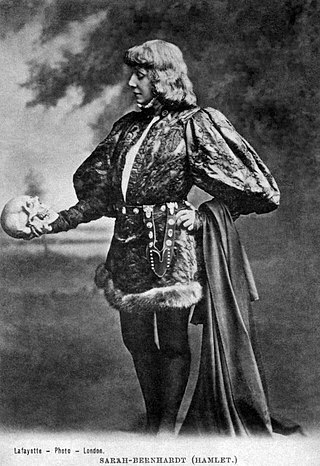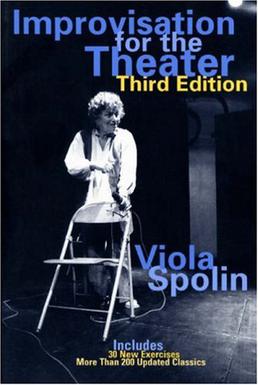Related Research Articles

Acting is an activity in which a story is told by means of its enactment by an actor who adopts a character—in theatre, television, film, radio, or any other medium that makes use of the mimetic mode.

Improvisational theatre, often called improvisation or improv, is the form of theatre, often comedy, in which most or all of what is performed is unplanned or unscripted, created spontaneously by the performers. In its purest form, the dialogue, action, story, and characters are created collaboratively by the players as the improvisation unfolds in present time, without use of an already prepared, written script.

Voice-over is a production technique where a voice—that is not part of the narrative (non-diegetic)—is used in a radio, television production, filmmaking, theatre, or other presentations. The voice-over is read from a script and may be spoken by someone who appears elsewhere in the production or by a specialist voice actor. Synchronous dialogue, where the voice-over is narrating the action that is taking place at the same time, remains the most common technique in voice-overs. Asynchronous, however, is also used in cinema. It is usually prerecorded and placed over the top of a film or video and commonly used in documentaries or news reports to explain information.

A theatre director or stage director is a professional in the theatre field who oversees and orchestrates the mounting of a theatre production such as a play, opera, dance, drama, musical theatre performance, etc. by unifying various endeavors and aspects of production. The director's function is to ensure the quality and completeness of theatre production and to lead the members of the creative team into realizing their artistic vision for it. The director thereby collaborates with a team of creative individuals and other staff to coordinate research and work on all the aspects of the production which includes the Technical and the Performance aspects. The technical aspects include: stagecraft, costume design, theatrical properties (props), lighting design, set design, and sound design for the production. The performance aspects include: acting, dance, orchestra, chants, and stage combat.

An animator is an artist who creates multiple images, known as frames, which give an illusion of movement called animation when displayed in rapid sequence. Animators can work in a variety of fields including film, television, and video games. Animation is closely related to filmmaking and like filmmaking is extremely labor-intensive, which means that most significant works require the collaboration of several animators. The methods of creating the images or frames for an animation piece depend on the animators' artistic styles and their field.

Space Jam is a 1996 American live-action/animated sports comedy film directed by Joe Pytka and written by Leo Benvenuti, Steve Rudnick, Timothy Harris, and Herschel Weingrod. The film stars basketball player Michael Jordan as a fictional version of himself; the live-action cast also includes Wayne Knight and Theresa Randle, as well as cameos by Bill Murray and several NBA players, while Billy West, Dee Bradley Baker, Kath Soucie and Danny DeVito headline the voice cast. The film follows Jordan as he is brought out of retirement by the Looney Tunes characters to help them win a basketball match against invading aliens intent on enslaving them as amusement park attractions.

Lee Strasberg was an American theatre director, actor and acting teacher. He co-founded, with theatre directors Harold Clurman and Cheryl Crawford, the Group Theatre in 1931, which was hailed as "America's first true theatrical collective". In 1951, he became director of the nonprofit Actors Studio in New York City, considered "the nation's most prestigious acting school," and, in 1966, was involved in the creation of Actors Studio West in Los Angeles.

Viola Spolin was an American theatre academic, educator and acting coach. She is considered an important innovator in 20th century American theater for creating directorial techniques to help actors to be focused in the present moment and to find choices improvisationally, as if in real life. These acting exercises she later called Theater Games and formed the first body of work that enabled other directors and actors to create improvisational theater. Her book Improvisation for the Theater, which published these techniques, includes her philosophy and her teaching and coaching methods, and is considered the "bible of improvisational theater". Spolin's contributions were seminal to the improvisational theater movement in the U.S. She is considered to be the mother of Improvisational theater. Her work has influenced American theater, television and film by providing new tools and techniques that are now used by actors, directors and writers.

In the performing arts industry such as theatre, film, or television, casting, or a casting call, is a pre-production process for selecting a certain type of actor, dancer, singer, or extra for a particular role or part in a script, screenplay, or teleplay. This process may be used for a motion picture, television program, documentary film, music video, play, or advertisement, intended for an audience.
A dialect coach is a technical advisor who supports actors as they craft voice and speech patterns for characters in the context of productions be it in an on-camera setting, stage setting, or voiceover setting.

Backstage, also previously written as Back Stage, is an American entertainment industry trade publication. Founded by Allen Zwerdling and Ira Eaker in 1960, it covers the film and performing arts industry from the perspective of performers, unions, and casting, with an emphasis on topics such as job opportunities and career advice. The brand encompasses the main Backstage magazine, and related publications such as its website, Call Sheet —a bi-monthly directory of talent agents, casting directors, and casting calls, and other casting resources.

Adventures in Voice Acting is a 2008 documentary DVD produced by Bang Zoom! Entertainment, featuring interviews from actors and crew members on the craft of voice acting. It was initially released as a set of DVDs, and has since been adapted into workshops and classes around the U.S.
Robert Francell Chew was an American acting coach and actor. He was best known for portraying drug kingpin Proposition Joe on the HBO drama series The Wire.

An audition is a sample performance by an actor, singer, musician, dancer or other performer. It typically involves the performer displaying their talent through a previously memorized and rehearsed solo piece or by performing a work or piece given to the performer at the audition or shortly before. In some cases, such as with a model or acrobat, the individual may be asked to demonstrate a range of professional skills. Actors may be asked to present a monologue. Singers will perform a song in a popular music context or an aria in a Classical context. A dancer will present a routine in a specific style, such as ballet, tap dance or hip-hop, or show his or her ability to quickly learn a choreographed dance piece.

An actor or actress is a person who portrays a character in a production. The actor performs "in the flesh" in the traditional medium of the theatre or in modern media such as film, radio, and television. The analogous Greek term is ὑποκριτής (hupokritḗs), literally "one who answers". The actor's interpretation of a role—the art of acting—pertains to the role played, whether based on a real person or fictional character. This can also be considered an "actor's role," which was called this due to scrolls being used in the theaters. Interpretation occurs even when the actor is "playing themselves", as in some forms of experimental performance art.

The American Repertory Theater/Moscow Art Theatre (ART/МХАТ) Institute for Advanced Theater Training at Harvard University was founded in 1987 as a training ground for the new American Theater by Robert Brustein.
The Hispanic Organization of Latin Actors (HOLA) is an active arts service and advocacy organization founded in 1975. It is in the United States and is dedicated to Hispanic artists, actors and actresses. It is not to be confused with H.O.L.A., Helping Outstanding Latinos Achieve, a program winning numerous awards and grants and created in 2012 by Katelyn and Madison Singh; although both advocate for the success of Latino populations.
The HLFS Urspung school is one of a few agricultural schools found in Austria and the flagship agricultural school for all western Austrian states. The school is located in the town of Elixhausen, within the Austrian state of Salzburg.
An acting coach or drama coach is a teacher who trains performers – typically film, television, theatre, and musical theatre actors – and gives them advice and mentoring to enable them to improve their acting and dramatic performances, prepare for auditions and prepare better for roles.

Race-reversed casting, also called photo negative casting, is a form of non-traditional casting in acting. The concept revolves around reversing the race of characters being played. The concept was intended as a way to open up non-traditional character roles to more actors but has received complaints that it waters down racial differences.
References
- ↑ "Casting workshops, agent workshops and acting courses | Just Add Milk (JAM)". Just Add Milk (JAM) | Making the Industry Accessible for Actors. Retrieved 2024-01-04.